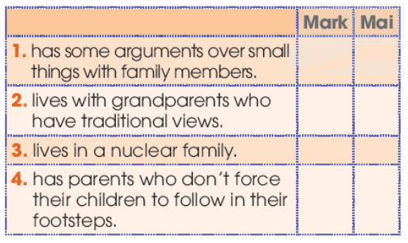Giải Tiếng anh Unit 2 lớp 11 Getting Started (trang 18, 19) - Global success
- 1Làm xong biết đáp án, phương pháp giải chi tiết.
- 2Học sinh có thể hỏi và trao đổi lại nếu không hiểu.
- 3Xem lại lý thuyết, lưu bài tập và note lại các chú ý
- 4Biết điểm yếu và có hướng giải pháp cải thiện
What is a generation gap?
Listen and read (Nghe và đọc)
Bài nghe:
Ms Hoa: Good morning, class. Today, we'll talk about the generation gap. So, what is the generation gap?
Mark: Well, I think it’s the difference in beliefs and behaviours between young and older people.
Ms Hoa: You're right, Mark, So, is there a generation gap in your family?
Mark: Not really, Ms Hoa. I live in a nuclear family with my parents and brother. We understand each other quite well though we still argue over small things.
Ms Hoa: Right. We can't avoid daily arguments. What about you, Mai?
Mai: Well. I live with my extended family, and I have to learn to accept the differences between the generations.
Ms Hoa: That's a good point. Can you give us an example?
Mai: Well, my grandparents hold traditional views about male jobs and gender roles. For example, my grandfather wants my brother to be an engineer. but my brother hopes to become a musician. And my grandmother thinks women have to do all the housework.
Ms Hoa: How about your parents? Do they share your grandparents’ views?
Mai: No, they don’t. They think that we should follow our dreams. They give us advice, but never force us to follow in their footsteps.
Ms Hoa: Thank you, Mai, for sharing your experiences. You must respect your parents and grandparents, but you should also express your opinion. Now let’s continue our discussion with ...
Find words or phrases in 1 that have the following meanings. (Tìm từ hoặc cụm từ trong 1 có nghĩa sau đây)
1. all people who were born at about the same time
2. a family that consists of a father, a mother, and children
3. a family that includes not only parents and children but also uncles, aunts, grandparents, etc.
4. disagreement about things
Choose the modal verbs used in 1 to complete the sentences (Chọn các động từ khiếm khuyết được sử dụng trong 1 để hoàn thành các câu)
1. Mai lives with her extended family, and she (has to / should) learn to accept the differences between the generations.
2. Mai’s grandmother thinks women (have to / should) do all the housework.
3. Mai’s parents believe that children (must / should) follow their dreams.
4. Ms Hoa thinks that children (have to / must) respect their parents and grandparents.
